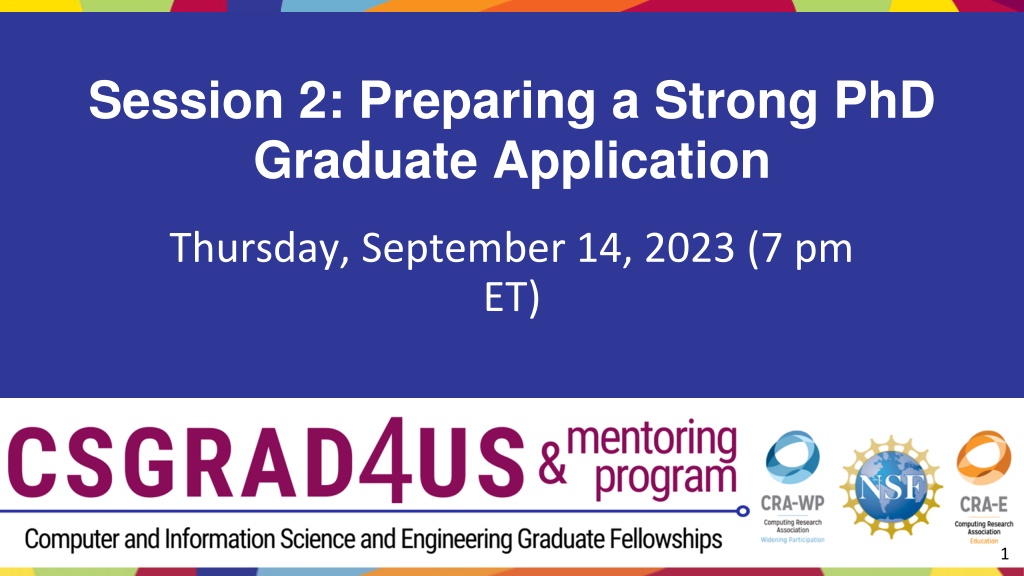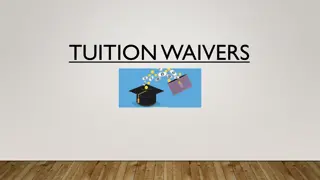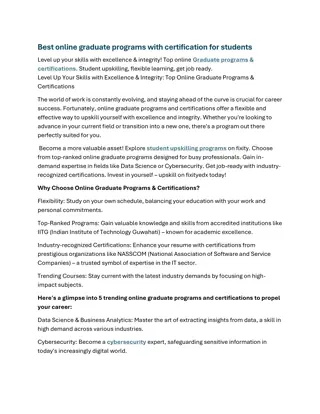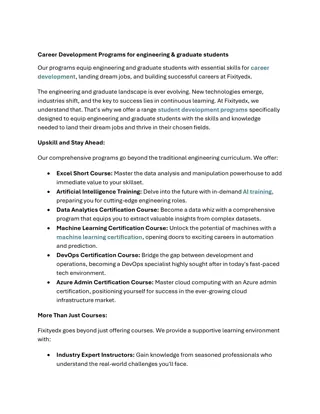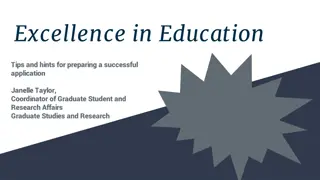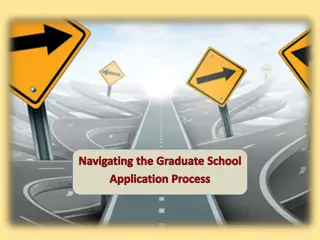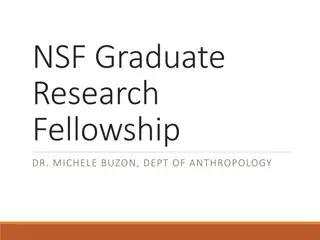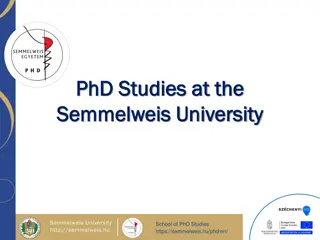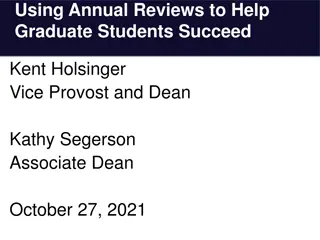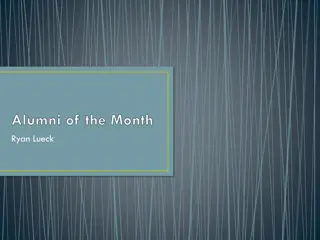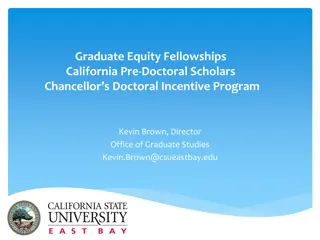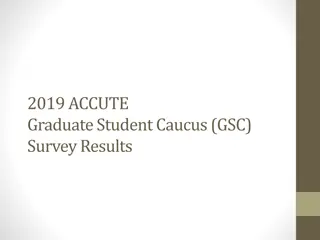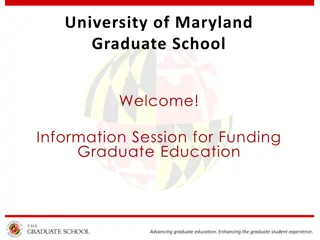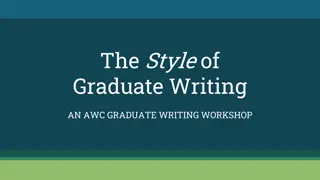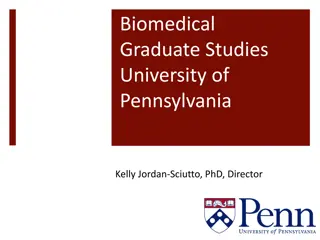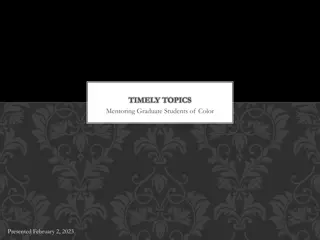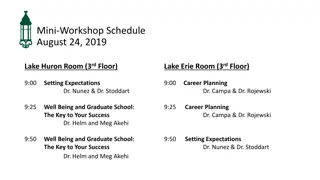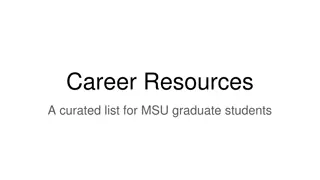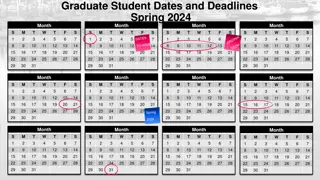Tips for Building a Strong PhD Graduate Application
Discover the key components and materials needed to strengthen your PhD graduate application, including writing personal statements, obtaining strong letters of recommendation, and showcasing your technical skills and research experiences. Understand what top grad schools look for in applicants and evaluate your academic background to meet their expectations effectively.
Download Presentation

Please find below an Image/Link to download the presentation.
The content on the website is provided AS IS for your information and personal use only. It may not be sold, licensed, or shared on other websites without obtaining consent from the author.If you encounter any issues during the download, it is possible that the publisher has removed the file from their server.
You are allowed to download the files provided on this website for personal or commercial use, subject to the condition that they are used lawfully. All files are the property of their respective owners.
The content on the website is provided AS IS for your information and personal use only. It may not be sold, licensed, or shared on other websites without obtaining consent from the author.
E N D
Presentation Transcript
Session 2: Preparing a Strong PhD Graduate Application Thursday, September 14, 2023 (7 pm ET) 1
The Four Major Application Components Personal Statement(s) Transcript(s) Deceptively Simple: Need to Create Your Story Letters of Recommendation GRE Scores (if required) 2
Learning Objectives Describe What Schools Want Brainstorm What You Have Application logistics Evidence of experience Evidence of skill set Evidence of mindset Research & industry experiences Advisors/mentors/bosses Technical skills Work personality Your research story & passion Your coach 3
Application Materials Transcripts and GREs Demonstrate technical knowledge and learning capabilities Resume (1-2 pages) Highlights research and work experiences Specifies learned skills (hard and soft) References to online portfolio of technical projects Personal statement (1 page) Document your experiences Describe your technical skills Explain path to research interest and specific area of interest Discuss work characteristics and growth experiences Letters of recommendation (3-4 people) People who can vouch for your intelligence, accomplishments, creativity, perseverance, potential for research, and other desirable attributes. 4
What Are Grad Schools Looking For? Have you taken courses/are knowledgeable on expected background? For CS programs, this includes data structures, algorithms, systems programming, and various electives Have you taken advanced, grad-level, or challenging courses? Do you have basic computing knowledge/CISE competency? 5
1 Minute Exercise: Write down courses you have completed and categorize (e.g., core, elective, grad-level, research-based) 6
What Are Grad Schools Looking For? Have you worked on a research project during ugrad, taken an independent study during ugrad, researched techniques for solving a complicated technical problem at work, or created a side project learning about state of the art approaches? Do you have basic computing knowledge/CISE competency? Do you know what research is? 7
1 Minute Exercise: Write down your research or other investigative activities 8
What Are Grad Schools Looking For? Have you recognized bigger implications of results for some technical solution, designed new technical solutions for a project at work, made connections between two unrelated topics to solve a problem? Do you have basic computing knowledge/CISE competency? Do you know what research is? Are you creative? 9
1 Minute Exercise: Write down problems you identified or solutions you designed 10
What Are Grad Schools Looking For? Have you taken independent study courses or advanced courses, identified key problems that need to be solved on a project, shown a commitment to learning specific topics, dedicated significant time and energy to a project, seen a project through to completion, continued working to find a solution after a first approach failed? Do you have basic computing knowledge/CISE competency? Do you know what research is? Are you creative? Are you self-motivated, hard- working, and persistent? 11
1 Minute Exercise: Write down projects you completed and/or initial failures you overcame 12
What Are Grad Schools Looking For? Do you have basic computing knowledge/CISE competency? Do you know what research is? Are you creative? Are you self-motivated, hard- working, and persistent? Can you work independently? Can you collaborate with others? Have you taken on a specific piece of a project as your own, worked as a leader of a group for a specific piece of a project, worked collectively with others on a larger project? 13
1 Minute Exercise: Write down projects you took initiative on or were a group leader 14
What Are Grad Schools Looking For? Do you have basic computing knowledge/CISE competency? Do you know what research is? Are you creative? Are you self-motivated, hard- working and persistent? Can you work independently/ collaborate with others? Do you have a research area that excites you? Have you worked on a research project in an area that excites you; worked on a technical problem at work that makes you want to dig deeper; worked on a personal project whose topic you want to research formally? 15
1 Minute Exercise: Write down research topics that excite you and why 16
Let's Look More Closely At Individual Application Parts 17
What a Resume Should Include Academic background Computing courses in college, course work or certifications since college Projects/employment/research Description of work topic Specific tasks and any leadership roles or independent tasks Outcomes - software applications, training materials, publications, web pages Technical competitions and awards CSGrad4US Fellowship awardee, including years and level of funding ACM Programming contest, Math Olympiad, Putnam exam (incl. scores) Skills Technical skills (e.g., programming languages, tools, libraries, etc.) Personal Portfolio and Activities Links to web pages for open-source or personal projects Computing outreach or volunteer work 18
Creating a Professional Online Persona Have a LinkedIn page A personal webpage gives you a place to provide more details about you and your work. Include: Research interests Publications and projects Link to CV/bio Teaching materials (if you have any) Media coverage (if any, no worry if you don t) Some personal information (if you want to share, not required) 19
Creating a Strong Resume Opportunity to provide more information than just the personal statement Can provide more information on specific job activities Can provide information about technical extracurricular activities Including links to online presence and portfolio Can provide information about specific technical skills Be succinct and use active words Own your contributions and successes Discuss independent and creative work Specify leadership and collaborative experiences 20
Resum vs CV (curriculum vitae) A resume is concise, brings up skills and experiences. A CV is longer and includes more details. Academics use CVs. Can be many pages long and cover research, teaching and service activities. Both have to be kept up to date. Everything relevant should be added regularly. The resum is tailored to the specific recipient (industry, academia, granting agency, etc). There are many career centers that provide examples and guidelines for resumes for different levels. 21
For Next Session: Critique Personal Statement Review sample resume and Jane Doe s personal statement on Canvas Identify 3 improvements to the personal statement Discuss your concerns and any improvements with your coach next week Add your comments to your groups file. We will discuss at start of Session 3 22
Writing an Effective Personal Statement Describe any prior research experience Describe your future research interests Describe your reason for wanting to get a PhD Demonstrate that you have ideas for interesting and important problems to study Personalize your statement with at least one paragraph about why the department and/or specific faculty interest you Discuss any discrepancies or rough patches on your path 23
What is Motivating You? Why did you go to industry after college? Tired of studying Didn't know what interested you Family commitments Student loan repayment What is motivating you to now want to pursue a PhD? You discovered a topic you're passionate about You want to work on different, more open-ended problems You want to be the person determining questions being studied You enjoyed research while in college and always intended to return to graduate study 24
1 Minute Exercise: Motivation Write down your motivations for going to industry and now for pursuing a PhD 25
Weaving Pieces Together to Tell Your Research Path Story Use answers to earlier questions: How have your experiences (in research, industry, extra-curricular activities) shaped your motivation to get a PhD? How have your experiences shaped what interests you? How have your experiences helped you develop skills needed to get a PhD in chosen area? Technical skills Soft skills (e.g., leadership, collaboration, communication) Personal characteristics (e.g., persistence, initiative) How has recovery from failure strengthened your ability or commitment to pursuing research? 26
2 Minute Exercise: Reflections Reflect on the questions listed on the previous page, making connections 27
Breakout Rooms Discuss one personal strength or challenge you overcame that you may highlight in your Personal Statement 28
Writing the Personal Statement will be harder than you expect and take more time Send a clear and precise message about you and your research potential and your research interests Can be hard to do within a word/page limit Material prepared for CSGrad4US applications was often an essay about applicant's life journey You don t know the audience Coach will give feedback, but don t expect rewrites Make use of writing resources Online resources A professional writer/writer friend Books Start early and revise frequently based on feedback 29
Personal Statement and more: Selected resources How to Write a Bad Statement for a Computer Science Ph.D. Admissions Application by Andy Pavlo (CMU) May be amusing to read, but we see such statements every year Applying to Ph.D. Programs in Computer Science by Mor Harchol-Balter (CMU) Aligns well with material we present; obviously some 2014 info is no longer current Example of a personal statement written by a student who was accepted and enrolled (2016), made available by MIT EECS Communication Lab Graduate Admissions Essays by Donald Asher (4th edition) Book that is not specific to computing, but has useful general advice and examples 30
Getting Strong Letters of Recommendation Letters from Other Disciplines Work 3-4 Letters Typically Required Make Each Letter Count Supervisors It can be hard to find 3-4 CS professors who know you well. It s okay to have letters from faculty in related fields ( e.g., EE, Math, etc.) A letter from a work supervisor is good. They can speak to recent work experience. A letter that only says this student did well in my class is not very helpful. Have at least one letter from a faculty member with whom you worked closely. No letters from TAs. Limit letters from lower-level instructors. 31
Determining Who to Ask Letter writers corroborate your story through their observations of you Who can attest to criteria being looked for in grad school application? Attest to your problem-solving abilities Attest to your intellectual capability Attest to your creativity Attest to potential to engage in research Attest to your ability to work independently Attest to your ability to work in a group, working well with others Attest to your ability to lead a group Attest to your written and verbal communication skills Attest to your ability to recover from failure and persevere Attest to your ability to work hard Attest to any challenges you faced along the way 32
1 Minute Exercise: Brainstorm People Did you work with a faculty member on a research or software development project? Did you do a research internship, perhaps at another school, at a lab, or in industry? Did you take an advanced class from a faculty member and later serve as its TA? Did you work on a development team implementing cutting edge techniques or research ideas? Could the lead of that team speak to your strengths? Do you have a work mentor/boss who can speak to your independent work, creativity, perseverance, follow-through, ability to adapt to lack of initial success or challenges, ability to collaborate, ability to lead a group? 33
How to Ask for a Recommendation Ask at least a month in advance Ask if they can write a strong, positive letter and give them a way to say "no" I m applying to graduate school. Would you feel comfortable writing a positive letter for me? If so, I d be grateful. If you are not able to do this for any reason, I ll certainly understand. Provide folder for their letter Application (resume, statement of purpose, web presence) Reminder of significant events that you participated in and excelled at We will provide a letter describing the Fellowship Offer to have a conversation to update them on your career and goals Provide industry writers with guidance on what to include Concrete experiences and projects Personal characteristics - Independence, creativity, motivation, follow-through, communication, leadership, teamwork, etc. 34
GRE Exam and Scores Check if GRE Scores are required by the institutions that you are applying to Investigate the expected GRE score ranges, and the scores importance to the application Prepare for the exam! Taking practice tests can help immensely You can retake the exam if you feel you could do better. However, the previous scores will still appear on your application Resources: https://www.princetonreview.com/grad/gre-information http://www.ets.org/gre 35
Questions? Have Questions later? Office Hours: Tuesday, 8-9pm ET SESSION 3 Thursday, September 28, 2023, 7:00-8:30 pm ET PhD Application Process, Identifying Programs and Schools 36
